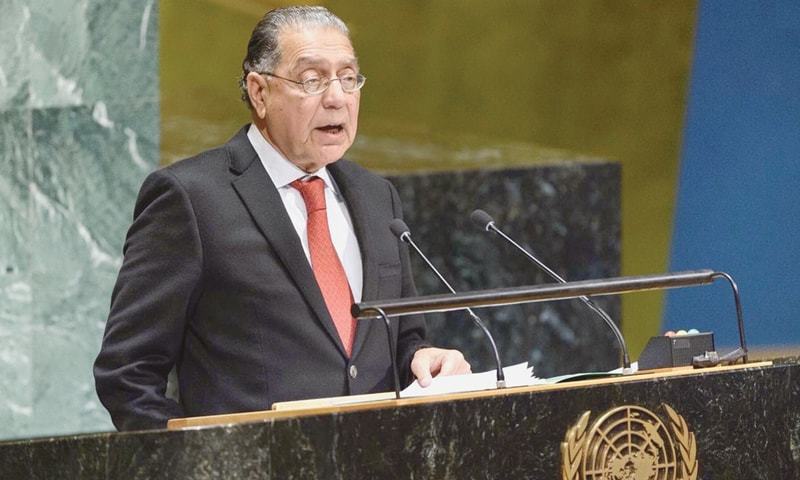UNITED NATIONS: Pakistan has urged the international community to prevent India from implementing the so-called ‘final solution’ in occupied Kashmir by turning its Muslim majority into a minority.
During an informal meeting on the UN Security Council’s plenary annual report on Monday, Pakistan’s permanent representative Munir Akram complained that the council had done little to rein in Hindutva extremist groups which were terrorizing Muslims across India, particularly in occupied Kashmir.
“The BJP-RSS government is putting in place what they have themselves called the ‘Final Solution’ in occupied Kashmir,” he said. “Demographic flooding by settler communities is meant to disempower and disenfranchise the Kashmiri people and to obliterate their Muslim identity.”
The Pakistani envoy reminded the world body that its own resolutions on Kashmir have remained unimplemented for more than 70 years now.
“The international community cannot succeed in its efforts to strengthen conflict prevention and promote the peaceful settlement of disputes if its own resolutions are willfully held in abeyance by some,” he said.
Ambassador Akram noted that the UN General Assembly’s annual report on the Security Council failed to illuminate the council’s decision making and measures taken on UN’s behalf. “The GA can’t act on information withheld.”
He underlined the need for refocusing the council’s efforts to combat terrorism, fascism and colonialism. “The council has focused on combating Al Qaeda and ISIS [militant Islamic State group] while ignoring terrorism by extremist and fascist Hindutva groups terrorising Muslims.”
The Pakistani envoy informed the participants that the council had last year held three meetings on the Jammu and Kashmir issue and the meetings confirmed the illegality of Indian action of Aug 5, 2019. The meetings also reaffirmed the disputed status of the territory and underscored the imperative for a peaceful settlement of the dispute in accordance with the UNSC resolutions, he said.
“But the council has been found wanting in the implementation of its own resolutions and decisions, including on J&K while sanctions committees require greater transparency,” he added.
Ambassador Akram insisted that the council should resolve the Kashmir dispute to make a larger point of how its own credibility was compromised when its resolutions were not enforced.
“For over 70 years, India has perpetrated a reign of terror in the occupied territory with 900,000 troops while eight million Kashmiris have been placed under a complete siege,” he said.
Published in Dawn, September 2nd, 2020














































